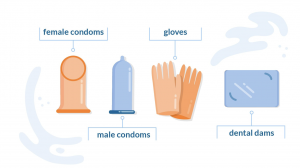
Can You Still Be Sexually Active With HPV?
HPV infections are very common, affecting millions of people in the United States and across the world. Despite its prevalence, people who are newly diagnosed with this infection get confused and have many questions in mind. One important question that people ask is whether it’s safe to have sex when you are positive with HPV.
The short answer is yes. You can have sex as long as you take protective measures to prevent the spread of the virus to your partner.
In this article, we will cover some evidence-based strategies to help you stop the spread of HPV.
Safe sex and HPV – Is it possible?
According to reports, most people come into contact with HPV. In many cases, these people won’t even know it. This is mainly due to the self-resolving nature of HPV. Therefore, you might get the infection without realizing it.
With that said, if you recently received the diagnosis of HPV, you should speak with your doctor to get tailored medical advice. Your doctor will also give you personal recommendations on how to have safe sex and prevent the spread of HPV.
Make sure to be transparent with your partner about being HPV-positive. You should also emphasize the importance of correctly using protective measures to have safe sex. This includes wearing condoms properly.
Note that asymptomatic HPV infection can also occur.
Is HPV Contagious Forever?
As we mentioned above, HPV infections can get resolved on their own. This typically occurs after one to two years. After this period, you will most likely become incontiguous since the virus leaves your body. However, there is still a possibility that the virus remains dormant for many years. Unfortunately, dormant viruses can still spread to other people.
How To Keep Yourself and Your Partner Safe
The transmission of HPV is not always detected. This is why you need to fully understand the causes and risk factors for this infection. This can help you protect yourself and your partner.
Here are some tips to help you with this:
Learn How HPV Spreads
Educating yourself about the routes of HPV transmission is indispensable to protecting yourself. Researchers identified that HPV spreads via:
- Vaginal contact
- Anal contact
- Oral sex
- Skin-to-skin contact
Regardless of how much you protect yourself, you could still get infected.
Talk to Your Doctor
If you suspect that you have HPV, make sure to consult with your doctor. Doing so will allow your doctor to order a few tests to confirm the diagnosis and prevent complications.
In case your doctor identifies genital warts, there are some procedures that can help in their management. Make sure to get the warts treated before engaging in any sexual relationship.
Individuals with asymptomatic cases of HPV can also benefit from consulting with their doctor. A doctor might highlight some subtle symptoms that you could be having. Moreover, they might help you develop a preventive plan to stop the spread of HPV. Unfortunately, precancerous lesions can even occur in people with asymptomatic HPV.
The risk becomes even bigger in people with compromised immune systems. For instance, individuals who have been smoking for many years, currently have HIV (human immunodeficiency virus), or take immunosuppressive drugs, are at a very high risk of HPV.
This is why it’s crucial to see a doctor about HPV.
Be Honest With Your Partner
We understand that speaking with your partner about having HPV or another sexually transmitted illness is not an easy conversation. However, this is important for your current and past partners to prevent health complications and seek medical assistance.
We recommend that you do some research about the topic and how to present it. This will help you carry the conversation more smoothly.
Remember that being positive with HPV does not mean you or your partner have been unfaithful. Research demonstrated that HPV can remain dormant for many years. Therefore, it can be very difficult to accurately pinpoint when you first contracted the infection.
If things go the other way around, and your partner explains that he tested positive for an STI, we highly advise you to stay respectful. The mere fact that your partner is informing you about this issue means they care about you and your health. Be open with them and try to work out a plan that helps you both.
Use Barrier Protection Correctly Every Time
Wearing condoms and dental dams is very effective in preventing the spread of HPV during sex.
However, these measures are dependent on the individual. For example, wearing the condom correctly and making sure it’s intact protects you from HPV. Failing to do so can actually predispose you to HPV infections.
Get The HPV Vaccine
The Centers for Disease Control and Prevention (CDC) states that individuals aged 11 to 26 should take the HPV vaccine. We call this vaccine Gardasil 9. This substance protects against the high-risk strains of HPV, especially those that cause genital warts and cervical/anal cancers. The most commonly targeted strains are 16 and 18.
The good news is that Gardasil 9 lowered the incidence of young women who have high-risk strains of HPV by 81%since 2006.
Children aged 11 to 12 should also receive two doses of Gardasil 9. Experts from the CDC state that children should take 2 doses of this vaccine 6–12 months apart. It’s true that children can delay taking Gardasil 9 until they are adults; however, researchers recommend taking the vaccine early on to prevent all future infections.
If a person reached 15 years old and hasn’t yet received the vaccine, they will need three doses instead of two. While you may think that Gardasil 9 is not effective for people who already contracted HPV, it can still protect against strains that you didn’t develop yet.
Pregnant women should not take the vaccine until they give birth. Despite the evidence that demonstrates the safety of the HPV vaccine for fetuses, we still need more research before we can confidently say that Gardasil 9 is safe for pregnant women.
Schedule Regular HPV and Pap Tests
Women above the age of 21 years should undergo Pap smears every three years. The procedure involves collecting cells from the cervix and testing them under a microscope. The pathologist will look for specific features that may indicate the presence of precancerous or cancerous cells. If the results are abnormal, your doctor will order further testing to confirm the diagnosis.
HPV tests are also helpful in detecting certain strains of HPV, which can cause cervical cancer in the long run. The same procedure of pap smears can still collect samples where microbiological tests are conducted. Doctors use polymerase chain reaction (PCT) to detect the genetic material of HPV and specify its strain.
Today, there is also an option to perform at-home HPV tests, which involves receiving a kit that contains a vaginal swab with a collective tube. You will also receive instructions with the kit.
At-home tests are able to detect up to 14 strains of HPV. These strains are high-risk, which means they can trigger cell mutations into cancer with time. The two most common strains that cause cervical cancer are HPV 16 and 18.
Takeaway message
The vast majority of HPV infections are self-resolving and do not lead to any complications. Taking proper measures and communicating with your partners is crucial to prevent the spread of HPV. Following these tips makes it possible to have sexual intercourse while being positive with HPV.
We hope that this article managed to explain the different aspects of having sexual intercourse while being positive with HPV.
If you have any questions or concerns about HPV or other sexually-transmitted illnesses (STIs), please do not hesitate to share your thoughts in the comment section







